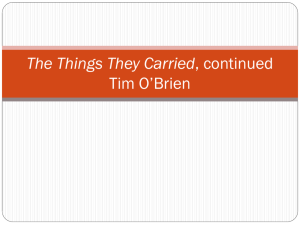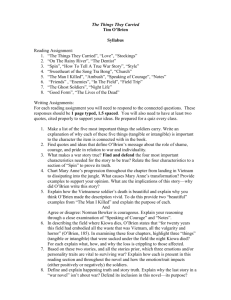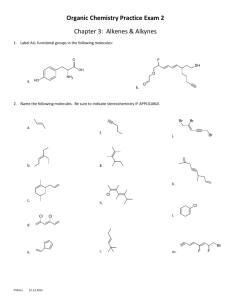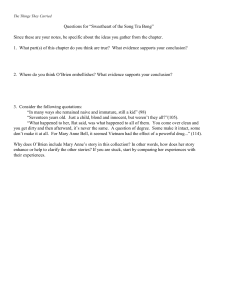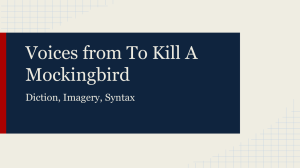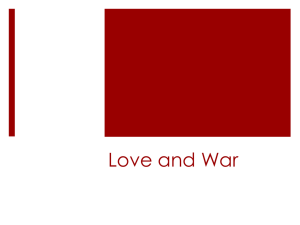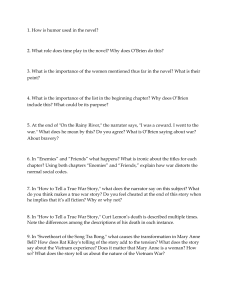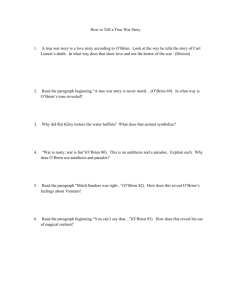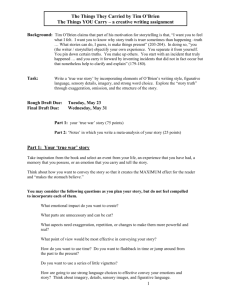The Things They Carried
advertisement
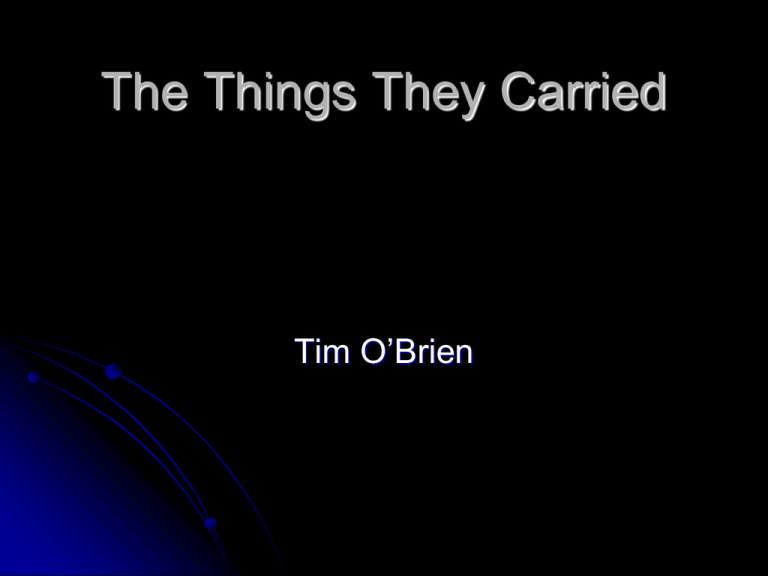
The Things They Carried Tim O’Brien The Things They Carried: Two Stories Okie From Muskogee We don't smoke marijuana in Muskogee. We don't take our trips on LSD We don't burn our draft cards down on Main Street; ‘Cause we like livin' right and bein' free. We don't make a party out of lovin'; But we like holdin' hands and pitchin' woo. We don't let our hair grow long and shaggy, Like the hippies out in San Francisco do. The Things They Carried And I'm proud to be an Okie from Muskogee, A place where even squares can have a ball. We still wave Old Glory down at the courthouse, And white lightning's still the biggest thrill of all. The Things They Carried Leather boots are still in style for manly footwear. Beads and Roman sandals won't be seen. And football's still the roughest thing on campus, And the kids here still respect the college dean. And I'm proud to be an Okie from Muskogee, A place where even squares can have a ball. We still wave Old Glory down at the courthouse. And white lightning's still the biggest thrill of all. And white lightning’s still the biggest thrill of all. The Things They Carried Fortunate Son Some folks are born made to wave the flag. Ooh, they’re red, white, and blue. And when the band plays “Hail to the Chief,” Ooh, they point the cannon at you, lord. It ain’t me, it ain’t me; I ain’t no senator’s son, son. It ain’t me, it ain’t me; I ain’t no fortunate one, no. The Things They Carried Some folks are born silver spoon in hand, Lord, don’t they help themselves y’all. But when the taxman comes to the door, Lord, the house looks like a rummage sale, yeah. It ain’t me, it ain’t me; I ain’t no millionaire’s son, no, no. It ain’t me, it ain’t me; I ain’t no fortunate one, no. The Things They Carried Yeah, some folks inherit star-spangled eyes, Ooh, they send you down to war, lord, And when you ask them, how much should we give? Ooh, they only answer more! more! more! It ain’t me, it ain’t me, I ain’t no military son, son. It ain’t me, it ain’t me; I ain’t no fortunate one, one. It ain’t me, it ain’t me, I ain’t no fortunate one, no, no, no. It ain’t me, it ain’t me, I ain’t no fortunate son, no, no, no. “Speaking of Courage” Intricate storytelling structure here: Whereas O’Brien writes in past tense, separating his current self from the self that fought in the war, Bowker is unable to use storytelling as a way to deal with his war trauma. Bowker has no one to talk to as a way to leave his war experiences behind him. Compelling metaphor: The sewage field represents an unpleasant, meaningless battle that none of the soldiers can escape; literally Kiowa, and symbolically Bowker, whose wading into the lake he drives around (and even tastes) signals his desire to return to Vietnam to change the events that ended Kiowa’s life. (Collela): “Bowker represents the paradox between the need for emotional truth and the pain many feel in expressing it.” “Notes” It’s here where we get to the crux of the question, “What is patriotism?” (page 156). This is O'Brien's search for authenticity in storytelling: Most of his writing comes from the “simple need to talk,” illustrating that his writing is his chosen form of relief from mental anguish. As such, his success in dealing with his mental anguish is directly related to his success as a storyteller: “By telling stories, you objectify your own experiences. You separate it from yourself. You pin down certain truths.” Bowker has no such avenue for relief. “In The Field,” “Good Form” No one emerges emotionally intact from the three perspectives of “In The Field.” Lt. Cross blames himself for not going against orders and setting up camp in a better spot. The young, unnamed soldier (presumably Tim) blames himself for his carelessness, turning on the flashlight to show Kiowa a picture of the young soldier’s girlfriend. When the men discover Kiowa’s body, they are overwhelmed by the sense of “bad luck” that caused his death – bad luck that could have claimed (and still could claim) any one of them. “In the Field” “Good Form” Consider how this same “luck” visited the Viet Cong soldier “O’Brien” killed in “The Man I Killed.” Reality, randomness, luck and war overwhelm all of them. “Good Form”: O’Brien distinguishes, again, the difference between “story truth” and “happening truth.” “Field Trip” The scene in the field is the climax of the story. O’Brien finds a sense of closure through the physical act of wading into the water and depositing Kiowa’s moccasins. Still, he is unable to explain this to his daughter, Kathleen, who represents the future. O’Brien’s lingering questions about Vietnam 20 years later: Is it a country, a memory, both, or neither? “The Ghost Soldiers”: Key Where (on his body) was O’Brien wounded the first time he was shot? His side After being shot a second time, what nearly caused his death? He almost went into shock. This chapter contains an allusion to Minneapolis. What or whom does O’Brien specifically mention? Met Stadium; Harmon Killebrew What is the first and last name of the guy O’Brien seeks revenge against? Bobby Jorgenson “The Ghost Soldiers”: Key Dobbins says “there’s no way” Morty Phillips (the guy who went swimming) could have died of … (name the disease). Polio Whom does O’Brien get to help him with his revenge plan? Azar In the series of pranks O’Brien planned, which was the final one? They set up a sandbag on a wire to look like a person. What did O’Brien’s partner-in-crime physically do to O’Brien out of disgust? Kicked him in the head. Other than the embarrassment of his wound and the fact that he almost died, what else is O’Brien bitter about as he recuperates? He is no longer part of the “brotherhood” of the men out in the bush. “The Ghost Soldiers” This story, and the one that follows (“Night Life”), both deal with how the night affects people: It is at night that “O’Brien” holds the most hatred for, and plots his revenge against, Jorgenson. It is at night that Vietnam comes alive – not the country but the war experience. Part of “O’Brien’s” bitterness is in the embarrassment of his wound (in the rear end) and the fact that he almost died, but more in the loss of his life as a combat soldier. He especially misses the brotherhood that he is now on the outside of, looking in. “The Ghost Soldiers” “O’Brien” acts out his need for making war – on Jorgenson – but in the process alienates Sanders, while befriending Azar. The reader realizes now how much “O’Brien” changed: He is no longer fighting for an ideal but for pure, raw, revenge. In the end, “O’Brien” – “trembling…hugging himself, rocking” has lost his friends, his memories, and his moral superiority. He is defeated. “Night Life” This story illustrates the fine emotional and mental stability line that the soldiers walk. The change in routine from day to night maneuvers pushes Kiley over that line and deep into himself, where he battles visions, terror and obsession. O’Brien goes to great lengths to show the impact of the night routine: dark so thick that it creates an inability to blink. When Kiley shoots himself in the foot in order to get out of there, it’s unclear if he does so because he has gone crazy or if he does so to prevent himself from going crazy. “The Lives of the Dead’ This is the story that encapsulates the novel’s purpose: writing in order to make sense of life, especially in relation to others’ deaths. Linda is O’Brien’s first love – and his first realization that fiction can overcome death. When this beautiful, little child dies, her innocence, and O’Brien’s, dies with her. Linda’s visits to O’Brien’s dreams begin a life-long process of addressing difficulty through imagination and illusion: an ability he carried with him to Vietnam. By keeping Linda alive – as well as his Vietnam comrades – O’Brien is keeping himself alive. “The Lives of the Dead” Important quotes from Tim O’Brien: “The act of writing is an act of compassion. It entails sympathy for human frailties, weaknesses, and strengths: sympathy for a human condition in which we can never be that to which we aspire. “Novels are made out of a sense of outrage at the world, the way the world treats us; the way we treat ourselves; the mistakes we make ourselves. Books come out of that sort of thing, that tension to make things better. “The thing about a story is that you dream it as you tell it, hoping that others might then dream along with you ... There is the illusion of aliveness.”
